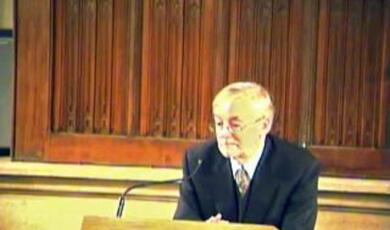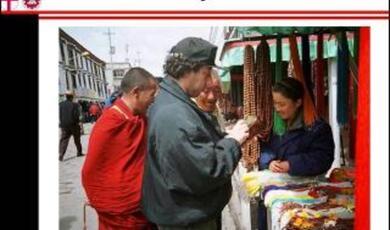Enemies at home: from class war to the war on crime
Share
- Details
- Text
- Audio
- Downloads
- Extra Reading
Hostility and demonisation in party political rhetoric in Britain. The differences between opponents, enemies, and 'threats to life as we know it'. What has happened to the two major parties?
Download Text
ENEMIES AT HOME: FROM CLASS WAR TO THE WAR ON CRIME
Professor Rodney Barker
*1 PICTURE
I spoke last month about the deceptiveness of the accounts we give of enemies, and how they are as often stories about ourselves as about those whom we paint in menacing colours.
The desert island and the two chapels
The coffee houses of eighteenth century London: The journalist, spy, and adventurer John Macky, writing in 1722, remarked that 'a Whig will no more go to the Cocoa Tree or Osinda's, than a Tory will be seen at the coffeehouse of St Jame's,'
Who your enemies are tells us who you are, or who you think you are, or who you wish to be.
But is Britain like that?: well, here is a story of party politics. Britain in the 20th century and the beginning of the 21st century. A story about a peaceful nation. We haven't had the language of enemies and enmity since the civil war of the seventeenth century or the Jacobite rebellions of 1715 and 1745-6. Or have we?
Three kinds of enemy in Britain
Or almost not. There have been three kinds of enemy pretty frequently described in this country since the last battle fought on British soil at Culloden in 1746:
2* PICTURE
Enemies of society: brigands, rioters, the poor and disaffected (the Victorian cauldron and Dickens's mob), new age travellers, crime.
The rifles in Child's Bank and 1780
Booth poverty maps of 1898
Foreign enemies: Spain, France, Germany, Russia, and now the stateless terrorist.
Traitors, who combine both features: religious traitors in the seventeenth century, political traitors in the nineteenth and twentieth centuries, and back to religious ones in the twenty first.
The threat from 'traitors' is frequently presented as both ideological and military: they have an alien religious or political belief, and they are associated with foreign powers which share those beliefs
The charge is always that loyalty lies elsewhere. This was simplified or intensified by the development of the sovereign nation state from the sixteenth century on: before that, treason and loyalty had a personal, patrimonial dimension, after that the enemy is depicted as an increasingly communal or national one.
There are two ways in which accounts of who is and who is not an enemy have been used:
the direct accusation or the direct description of an enemy,
accusing someone of, at the worst, treason;
The indirect is a way of stigmatising those who are not and are not described as, enemies, but are political opponents in competition for the votes of the public, but who are accussed of wittingly or unwittingly aiding and abetting an enemy.
The tactic then is to say they are encouraging, or are the unwitting dupes of, enemies. So in April 2007 George W Bush criticised the visit to Syria of the Speaker of the House of Representatives, the Democrat Nancy Pelosi, by saying that her visit was wrong because Syria was a "state sponsor of terror", and not part of the mainstream of the international community. The implication is clear. Not an enemy, but consorting with the enemy. Senator McCarthy was less subtle fifty years earlier, in dismissing those who disagreed with him as 'dupes of the Kremlin'
But politicians are not concerned about nice definitions and distinctions, and the accounts of enemies are frequently a melange of enemies abroad, threats from below, and deliberate or unwitting treason.
And the language of enmity and treason is often used when all that is happening is an attack on political opponents. Political rhetoric and the account of enemies has exaggeration as one of its principal features
The contemporary US journalist Ann Coulter, in a book whose title probably tells you everything before you open the first page, Treason : liberal treachery from the cold war to the war on terrorism, writes:
'Liberals have a preternatural gift for striking a position on the side of treason. You could be talking about Scrabble and they would instantly leap to the anti-American position. Everyone says liberals love America. No they don't. Whenever the nation is under attack, from within or without, liberals side with the enemy.'
That's clearly not what Coulter believes to be true
The accounts people give of those they oppose may not be accurate accounts of enemies, but they are consistently revealing about the narrator
Looking at the combination of these two methods - direct and indirect - in the twentieth century and after, can be revealing about the changing character of party politics in contemporary Britain:
The change in the language used to describe enemies and opponents illustrates the end of traditional class politics and the rise of a New Labour and of a New Right with very different identities, and very different accounts of their enemies.
It also illustrates how valuable parties can find tales of enemies, the bogy men to scare the children back to bed, and how difficult they often find it to be without convincing tales of enemies
For much of the twentieth century, Labour and Conservative accounts of their enemies were pretty constant
*3 PICTURE 1931
Enemies in the twentieth century: Labour
Labour at the start of the twentieth century was the party of the outsiders and the excluded, the oppressed and the unjustly treated. On the one hand it presented a socialist aspiration whereby the democratic state should distribute the social product for the benefit and flourishing of the whole society and all of its members;
On the other it claimed full social membership for those, specifically the working class, who whilst fully qualified in terms of moral worth, political responsibility, and economic participation, were denied the full social, economic, or political benefits enjoyed by the more privileged.
The 'full fruits of their labours' to which the party's 1918 constitution laid claim were to be not only economic, but cultural, political and social as well. The party's understanding was shaped by the perceptions of class, and the division between its own constituency and those who already enjoyed the benefits it was claiming for all was one of good fortune, wealth, and power
Opponents were presented as selfish or incompetent or indifferent to social morality, those who took an unfair share of opportunity, wealth, and power.
The Labour Representation Committee's manifesto at the General Election of 1900 attacked 'Capitalism and Landlorism',
Five years later the party complained that while working people were little seen in the Commons, 'Landlords, employers, lawyers, brewers, and financiers are there in force.' It was clear who the enemies were: specific groups of wealthy employers who were profiting at the expense of ordinary people.
At the first of the two general elections of 1910, Labour rhetoric of landlordism was mingled with a radical liberal juxtaposition of peers versus people.
'the people' were those who worked for a living, in contrast with those who were presented as living off the labour of workers. The House of Lords was 'an irresponsible body which represents nothing but its own class interests'.
at the general election of 1918, the antagonist was represented as specifically profiteering from the war, a charge which if it did not imply treason, certainly implied malingering or free-loading whilst others were sacrificing labour, income, and life: 'Labour's appeal to the people is not a sectional appeal, unless an appeal which excludes only militarists, profiteers, and place-hunters be regarded as sectional. It includes all who are determined that the fruits of victory shall not be wasted in the interests of riches or reaction.'
Summed up by the socialist journalist and propagandist Robert Blatchford entitled his 1902 book 'British for the British' it was an untypical use of the language normally associated with the exclusive rhetoric of nationalism in the presentation of a domestic argument.
Enemies in the twentieth century: Conservatives: The defence of those who had something to loose from
Enemies abroad, particularly the Soviet Union and communism (remember the Zinoviev letter)
Enemies of society: disruptive trade unions,
Traitors, deliberate or duped and disloyal revolutionaries
Plus misguided government, and an intrusive, or inappropriately intrusive, state
And as with all political rhetoric, the purpose was not intellectual clarity but political impact, so the categories could frequently be jumbled up:
Quintin Hogg in 1947:
'Conservatives do not believe that political struggle is the most important thing in life. In this they differ from Communists, Socialists, Nazis, Fascists, Social Creditors and most members of the British Labour Party. The simplest among them prefer fox-hunting - the wisest religion.'
For over half of the twentieth century the Conservative Party was the party of government and saw itself as the nation's natural custodian. Other parties could be presented as having doctrines and dogmas, the Conservative Party simply expressed and conserved an existing and valued set of principles and practices, common sense, and could claim that it
'bases its appeal on existing fact or on historic record'.
Its political opponents could thus be depicted as ideologues, troublemakers, demagogues, and subversives.
This enabled the indirect charge to be made. Thorough going enemies were either abroad or were elements at home who threatened social stability. They were not supported, or not deliberately and consciously supported, by the party's electoral opponents.
So the charge of indirect, duped enmity served two purposes: you avoided looking as if you were making serious charges against mere parliamentary opponents, but you tarred them with the brush of association with those who could be presented as a genuine threat
Whilst it appealed, as did the Labour Party, to an electorate whose major dimension was social class, the Conservative Party's attacks were not class-based, but directed against those who were presented as misusing or exploiting class: intellectual left-wingers and radicals, and militant trade unionists.
Links between socialism and foreign enemies, both German and Russian, were intermittently made throughout the twentieth century to give a totalitarian hue to the depicted image of the Labour Party in particular and the left in general.
Socialism was, said the Conservative leader Stanley Baldwin, 'proletarian Hitlerism' and during the 1945 General Election Winston Churchill told electors that the Labour Party would be able to carry out its socialist programme only by using 'some form of Gestapo'. An election broadcast during the second 1974 campaign included purported quotes from Communists on their influence on Labour Party policies, and during the 1983 General Election an advertisement carried the caption, 'Like your manifesto, comrade'.
The disappearance of the communist/Soviet enemy and hence of a 'dupe' candidate
As the end of the chronological twentieth century approached, there was a shift in emphasis, particularly after 1989 when two enemies, the Russian communist menace and the 'soviet dupe' were no longer available
The conservatives' internal enemy, the trades unions, lingered on in the rhetoric
But now new enemies were added:
Terrorism and immigration first paralleled and then replaced communism as the menace from overseas and from a Northern Ireland which was treated as both domestic and foreign, a semi-detached part of the United Kingdom, though trade unions retained their place as the naïve or manipulated Trojan horses of danger and destruction.
Terrorism and immigration were more shadowy than either the Soviet Union or the murderous politics of Northern Ireland, but together with crime and disorder, they became the principal depicted threats against which a successful Conservative Party would defend the electorate.
The party's account of its opponents, and of the threats from which it aimed to protect people, was thus a wide ranging synthesis of domestic and foreign perils with which the trade unions were directly or by implication with simple joint listing, associated.
In February1974 two sections of the party's election manifesto dealt respectively with 'The Danger from Outside' and 'The Danger from Within'. The former was economic, the latter the demands and actions of the miners. At the second general election of that year trade unionists were again singled out as threatening adherence to the law, whilst lawlessness and terrorism were then linked as twin threats, though without specifying, though nonetheless clearly suggesting, from whom the threat of lawlessness came. Trade unionism was thus not labelled as a terrorist enterprise, but stigmatised by the company with which it was associated. It was a narrative famously repeated by the Conservative leader and Prime Minister Margaret Thatcher after the party's return to office, during the miners' dispute of 1984-5 in her reference to the 'enemies within'.
The development of immigration as a described threat was intensified further in the 1980s by complementing the account of abstract immigration with the more concrete immigrants, some of whom were now stigmatised as 'bogus', and against whom 'we have to guard'. Voters were told that the government had 'defended civilised values by fighting terrorism relentlessly' and urged them to 'Remember: The year-long coal strike with its violence and intimidation on a massive scale'. Crime and immigration were linked in 1992, when it was promised that 'Finger-printing will be introduced for asylum applicants, to prevent multiple applications and fraudulent benefit claims.' At the same time terrorism was presented as a threat, the defences against which the Labour Party was proposing to 'weaken or dismantle'.
Attempts of New Age Travellers in the United Kingdom to reach Stonehenge for the summer solstice in the years 1985-92 involved both the presentation of the travellers as folk devils, and an assertion of the identity of 'established' groups and cultures. Douglas Hurd, when Home Secretary, referred in the House of Commons to the travellers as a 'band of medieval brigands who have no respect for law and order and the rights of others', whilst the Prime Minister, Margaret Thatcher, proclaimed in the same month her intention to 'make life difficult for such things as hippy convoys'. The definition of New Age Travellers as strange, culturally alien, transient, outlandish, threats to family and home, who had to be combated, and for whom it was quite in order for state and society to 'make life difficult', implied and sustained an image of the speaker and the speaker's audience as quiet, law-abiding, peaceful, respectable, 'ordinary'.
One of the most forthright instances of the presentation of an enemy complex linking internal and external enemies, was a speech given by Michael Portillo when Chief Secretary to the Treasury in January 1994. 'For decades we have allowed ourselves to fall prey to cynics, egalitarians and socialists. The spread of the New British Disease is not just an accident. Since the time that Marx and Engels lived and wrote freely in Britain, we have tolerated, even encouraged, those with anti-establishment views to settle here and develop their ideas.'Foreigners and socialists, egalitarians and anti-establishment cynics, were merged into a motley threatening force.
After the election defeat of 1997, the new party leader William Hague sided his party with 'all the people who think that the law should be on the side of the house-owner and not the house-breaker'. He invoked the image of 'young thugs walking free from our courts' and 'a council estate where the criminals take control after dark'. The Conservatives would have 'no more of Labour's early release schemes for rapists and burglars and muggers' and would 'step up the war against drugs, not surrender to the drug dealers'.
The general election manifesto of June 2001 described the triad of 'criminals and young offenders';
Europe, from whose domination the country was to be freed and which in its turn needed freeing from 'fraud and maladministration'; the 'thousands' of asylum seekers who, when their applications are rejected, 'simply disappear and never leave'.
The end of the short twentieth century
The end of the cold war removed the readily available and well-established soviet/communist threat. At the same time the identity which previously had been the particular character of the Conservative Party as the defender of families, family property, public order, and social peacefulness, was adopted with at least as much skill by the Labour Party.
'New' Labour and the shifting of the enemy above to the enemy below
We have moved beyond class war to a contest where each party presents itself as the advocate of those who already have something to loose, and neither party presents themselves as claimants on behalf of those who are demanding justice.
Approach to the general election of May 1997 the Labour leader made a series of forays into the depiction of threats to society. Whereas in the past Labour opponents and antagonists had been depicted as above the assumed audience - richer, more powerful, more privileged - this dimension was now complemented by threats, which began to assume the appearance of enemies, from below - crime, violence, and the threat of violence: 'trains vandalised, city centres clogged up, the countryside spoiled; elderly people unable to enjoy their retirement because they live in fear'.
And it was the antagonists below who were most graphically presented, and for the first time a Labour depiction of antagonists portrayed more tangible threats from below than injustice from above. Blair did not want a country, he told his audience, where children 'can see drugs being traded at school gates; where gangs of teenagers hang around street corners, nothing to do, but spit and swear and abuse passers-by'.
'I back powers' he went on 'to tackle anti-social neighbours; to make parents responsible for their children; to overhaul the youth justice system so that youngsters stop thinking they can commit a crime, get a caution and carry on being a criminal.'
A year in to the new government saw the threats from below in sole possession of the minatory field: children faced 'More violence. More crime. Drugs. Families breaking down. The old moral order under strain.'
This was a major change in the way in which the party sought to portray itself, from a claimant on society on behalf of those excluded from its benefits, to a defender of an existing order against those whose actions damaged it, a protector of 'ordinary' people from disruption from both abroad and below. The shift was one both of the party's, or the party's leaders', self-presentation, and of its perception of its electoral constituency. The appeal which it was now making was no longer to those who had something to gain, but to those who had something to lose.
Both parties still casting around for new maps, and rather than presenting their own particular versions of friends and enemies, are often squabbling over who hates common enemies most. Unlike the Eighteenth Century, they are fighting over coffee houses as much as avoiding them
C. P. Cavafy:
'Some people arrived from the frontiers,
and they said that there are no longer any barbarians.
And now what shall become of us without any barbarians?
Those people were a kind of solution.'
A man cannot be too careful in his choice of enemies, and in the changes which the two major parties have made in the enemies they have chosen, they tell us first not about the threats out there, but about themselves
©Professor Rodney Barker, Gresham College, 5 November 2007
This event was on Mon, 05 Nov 2007
Support Gresham
Gresham College has offered an outstanding education to the public free of charge for over 400 years. Today, Gresham College plays an important role in fostering a love of learning and a greater understanding of ourselves and the world around us. Your donation will help to widen our reach and to broaden our audience, allowing more people to benefit from a high-quality education from some of the brightest minds.


 Login
Login







